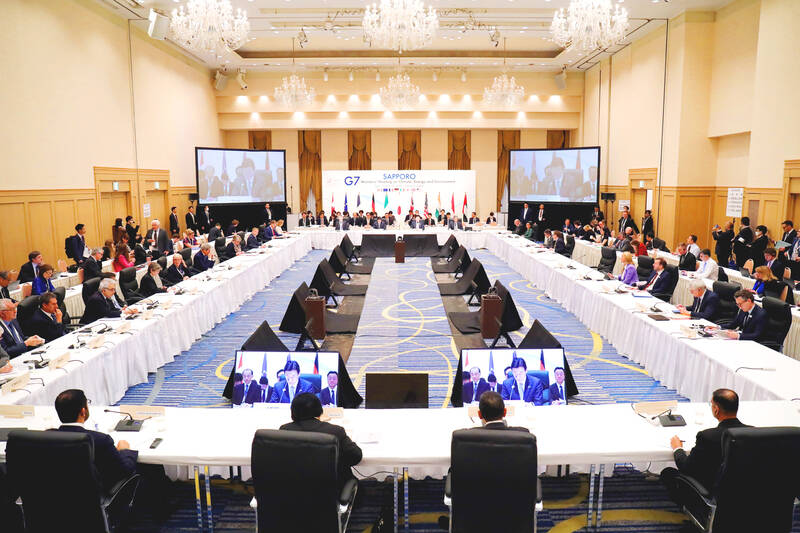The G7 yesterday pledged to quit fossil fuels faster and urged other countries to follow suit, but failed to agree to any new deadlines on ending polluting power sources such as coal.
The language reflects the depth of disagreements among member states on the balance between climate action and energy security, with host Japan leading a pushback against the most ambitious proposals discussed.
After two days of talks in the northern city of Sapporo, the bloc’s climate and environment ministers vowed to “accelerate the phase-out of unabated fossil fuels so as to achieve net zero in energy systems by 2050 at the latest ... and call on others to join us in taking the same action.”

Photo: EPA-EFE
However, they offered no new deadlines beyond last year’s G7 pledge to largely end fossil fuel use in their electricity sectors by 2035.
French Minister of Energy Transition Agnes Pannier-Runacher said the “phase-out” wording was nonetheless a “strong step forward” ahead of the G20 and UN climate summits.
The UK and France had put forward a new goal of ending “unabated” coal power — which does not take steps to offset emissions — in G7 electricity systems by 2030.
However, with global energy supplies still squeezed by Russia’s invasion of Ukraine, the target faced pushback from other members, including bloc president Japan and the US.
“I would obviously have liked to have been able to make a commitment to phase out coal by 2030,” Pannier-Runacher said.
“It is one issue on which we can still make progress in forthcoming discussions, particularly at COP28,” she said, referring to a UN climate conference in Dubai, United Arab Emirates, in November.
All members of the G7, which also includes Germany, Italy, Canada and the EU, target net zero emissions by 2050 or sooner after signing the Paris Agreement to cap warming at well below 2°C, and ideally 1.5°C.
The ministers had been under pressure to announce bold steps after a major UN climate report last month said that a 1.5°C increase would be seen in about a decade without “rapid and far-reaching” action.
However, campaigners expressed fears ahead of the talks that Japan, supported by Germany and others, could lead backsliding on pledges such as ending new overseas fossil fuel financing.
G7 leaders last year said that the “exceptional circumstances” of the Ukraine war made gas investments “appropriate as a temporary response.”
Yesterday’s statement contains similar language, but also sets multiple parameters around such investments and highlights the “primary need” for “gas demand reduction.”
Still, climate campaigners said that the ambiguity sends the wrong message.
“The science is crystal clear that leaving the door open to investments in new gas or [liquefied natural gas] leaves the G7 off track for 1.5°C,” Oil Change International global public finance comanager Laurie van der Burg said in a statement.
Japanese Minister of Economy, Trade and Industry Yasutoshi Nishimura nonetheless characterized the communique as “ambitious” and praised the G7 for “recognizing diverse paths towards carbon neutrality” during the energy crisis.
International Energy Agency executive director Fatih Birol said he was pleased with the statement.
“It combines our current energy security concerns and it also provides a road map on how we deal with the climate crisis,” he said, adding that Japan had played a “responsible and constructive” role.
However, the bloc stopped short of endorsing Japan’s strategy of burning hydrogen and ammonia alongside fossil fuels to reduce emissions — which climate campaigners say only serves to extend the lifespan of polluting plants.
Yesterday’s statement simply noted that “some countries are exploring” the potential of hydrogen fuels, adding that this should be “aligned with a 1.5°C pathway.”
Attempts to commit to halving emissions from vehicles in the G7 by 2035 also floundered, but the group for the first time pledged to end new plastic pollution by 2040.
The statement also urged a peak in global greenhouse emissions by 2025 at the latest.
Experts say this language is aimed at the world’s largest carbon emitter, China, which is targeting a peak in its emissions by 2030.

Thousands gathered across New Zealand yesterday to celebrate the signing of the country’s founding document and some called for an end to government policies that critics say erode the rights promised to the indigenous Maori population. As the sun rose on the dawn service at Waitangi where the Treaty of Waitangi was first signed between the British Crown and Maori chiefs in 1840, some community leaders called on the government to honor promises made 185 years ago. The call was repeated at peaceful rallies that drew several hundred people later in the day. “This government is attacking tangata whenua [indigenous people] on all

RIGHTS FEARS: A protester said Beijing would use the embassy to catch and send Hong Kongers to China, while a lawmaker said Chinese agents had threatened Britons Hundreds of demonstrators on Saturday protested at a site earmarked for Beijing’s controversial new embassy in London over human rights and security concerns. The new embassy — if approved by the British government — would be the “biggest Chinese embassy in Europe,” one lawmaker said earlier. Protester Iona Boswell, a 40-year-old social worker, said there was “no need for a mega embassy here” and that she believed it would be used to facilitate the “harassment of dissidents.” China has for several years been trying to relocate its embassy, currently in the British capital’s upmarket Marylebone district, to the sprawling historic site in the

‘IMPOSSIBLE’: The authors of the study, which was published in an environment journal, said that the findings appeared grim, but that honesty is necessary for change Holding long-term global warming to 2°C — the fallback target of the Paris climate accord — is now “impossible,” according to a new analysis published by leading scientists. Led by renowned climatologist James Hansen, the paper appears in the journal Environment: Science and Policy for Sustainable Development and concludes that Earth’s climate is more sensitive to rising greenhouse gas emissions than previously thought. Compounding the crisis, Hansen and colleagues argued, is a recent decline in sunlight-blocking aerosol pollution from the shipping industry, which had been mitigating some of the warming. An ambitious climate change scenario outlined by the UN’s climate

BACK TO BATTLE: North Korean soldiers have returned to the front lines in Russia’s Kursk region after earlier reports that Moscow had withdrawn them following heavy losses Ukrainian President Volodymyr Zelenskiy on Friday pored over a once-classified map of vast deposits of rare earths and other critical minerals as part of a push to appeal to US President Donald Trump’s penchant for a deal. The US president, whose administration is pressing for a rapid end to Ukraine’s war with Russia, on Monday said he wanted Ukraine to supply the US with rare earths and other minerals in return for financially supporting its war effort. “If we are talking about a deal, then let’s do a deal, we are only for it,” Zelenskiy said, emphasizing Ukraine’s need for security guarantees